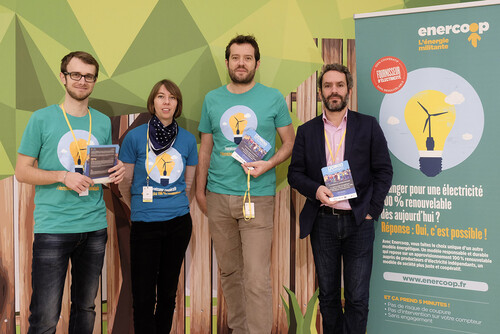How to republish
Read the original article in french and consult terms of republication.
Local alternative organisations, a driver to encourage people to consume less

Nearly half of France’s carbon footprint is currently connected to "imported emissions", i.e. emissions related to manufacturing goods overseas for consumption on national territory.
This observation is feeding an entire institutional policy, aiming to modify the consumption habits of our fellow citizens in order to fight global warming. As political science researcher Yannick Rumpala says, this represents a “governmentalisation of consumption”, with the idea that “many ways of improving the situation could take place in hypermarket and supermarket aisles”.
A fight for cultural hegemony seems to be raging, between consumer culture and consume-less culture. This was the observation at the basis of the Esadicas project (Socio-Anthropological Study on Acclimatisation Mechanisms for Consuming Less), which we undertook with the support of the French Agency for Ecological Transition (ADEME).
“On the one hand, some consumers (still) value consumption – even making it a tool for socio-political action. On the other, certain consumers denounce consumption, aiming to reduce their own and instead adopting existential alternatives, insisting that there is no need to consume so much, or else even that consumption is dangerous – psychologically, socio-culturally, ecologically.”
There is therefore an invitation to consider how to acclimatise individuals to this second model, how to make them "internalise" it. One option for doing this is through the notion of cultural hegemony, theorised by Italian philosopher Antonio Gramsci. Cultural domination may transcend force by relying on its power of attraction. To this end, our research highlights the potential of alternative organisations set up locally, which, though strong, has not been fully exploited.
A domestic culture
Findings from studies into the individual reception of various political mechanisms for acclimatisation offered to consumers show that these mechanisms are not really working. Several reasons explain a certain resistance to the change. Specifically, consumers do not receive environmental information (like CO2 labelling on products) passively and sometimes interpret it in the opposite way than intended. Some even display what we call "environmental akrasia": they paradoxically decide to consciously do the opposite of what they know they should do.
Alongside these individualising mechanisms, however, research into citizen organisations designated as collective mechanisms of acclimatisation to consuming less demonstrates that it is possible to contribute at a local level to spreading different modes of consumption.
The mechanisms analysed (6 renewable energy collectives) represent a deliberate, freely chosen commitment to the environmental transition from consumers. Organisations created in this way by citizens, in opposition to or alongside government or private actors, are based on common values.
Developing such alternative, citizen organisations may be the way to a ‘future world’ more in line with the reduced levels of consumption required by the fight against climate change.
Such organisations have existed for many years, but still remain on the margins. Nevertheless, a sustained groundswell in favour of local alternative ecosystems has been developing since the 2000s in France, for example, with the growing success of CSA (community-supported agriculture) organisations, promoting short circuits.
It also seems important to modify consumption to be more local, "earth-based" as sociologist Bruno Latour calls it. Here, it is not a simple perception of proximity but rather someone who is "rooted" to the earth. Collectives that we met as part of our research project are recreating a household culture, of local domesticity. One example is AlterConso, which distributes local, organic products around Lyon in connection with farmers, or Enercoop Languedoc-Roussillon, which has organised a renewable energy sector with local governance.
In this context, the idea of alternative ecosystems as described in “Ecotopia” ("Eco" for house, "Topia" for place), the 1975 bestseller by American journalist Ernest Callenbach, becomes far more meaningful. By setting up short circuits, these mechanisms feed into a local dynamic using locally available resources and generate a network of initiatives with nearby partners who share similar objectives and values. Furthermore, the means of democratic governance seen in these ecosystems is socially unique.
Nevertheless, certain obstacles lie in the way of developing these mechanisms. Resources, financial but also more simply time-based, and expertise remain necessary. The collectives also come up against institutional obstacles concerning regulations to be followed, as well as the bureaucracy involved in calls for projects, and often are very wary of being instrumentalised to access resources.
Questions of terminology
More than other types of actors (local authorities, institutions, financiers, associations, etc.), working at the citizen collective level seems to be preferable to strengthen citizens’ acclimatisation to consuming less. Though said collectives are not hostile to this, it is not their number one aim, as shown by discourse analysis.
The collectives we met adopt a critical position in relation to the current energy system and what anthropologist Alain Gras calls a ‘thermo-industrial’ society. Nevertheless, their approach is characterised less by a position of resistance or opposition than by reflection around a positive projection of the future. This has led to propositions for concrete, economic alternatives. It is a question of planning ahead, through taking action and organising alternative means of production for a preferable future, in the face of a stressful situation.
Similar to the work of sociologist Michel Lallement around the hacker mindset of "doing", here, it is a question of ‘doing differently’. Two types of transformative aims represent the motivation of these collectives. While some are working for local transformation, in connection with economic projects, to maintain agricultural activities in the local area or develop energy efficiency solutions, others seem to aim more to transform society, specifically, to get ordinary citizens involved in more long-term collective projects.
In this way, the idea of consuming less does not seem to be a relevant discursive category in categorising their modes of consumption. If it is used, it is in reference to a normative framework defined by institutions by Ademe or leading associations, for example, the Negawatt scenario.
Their own systems of consumption norms remain more oriented towards a lexicon referring to the ‘local’ and the ‘ecological transition’. The term "consuming less" is not shared, it is misunderstood and it can even push people away. Because of this, it is still difficult to transmit and spread, even in activist ecosystems.
In this, if citizen collectives are seen as actors to be mobilised to move away from consumer culture, they will still need to work differently to better spread consume-less culture...![]()
Identity card of the article
| Original title: | Les organisations alternatives locales, un levier pour promouvoir une consommation plus sobre |
| Authors: | |
| Publisher: | The Conversation France |
| Collection: | The Conversation France |
| License: | The original version of the article was published in French by The Conversation France under Creative Commons license. See the original article. An English version was created by Hancock & Hutton for Université Gustave Eiffel and was published by Reflexscience under the same license. |
| Date: | April 24th, 2023 |
| Langages: | French and english |
| Keywords: | Consumption consuming less, community-supported agriculture (CSA), Ademe, environmental transition, sustainable consumption, local consumption |

![[Translate to English:] Licence creative commons BY-SA 4.0 [Translate to English:] Licence creative commons BY-SA 4.0](https://reflexscience.univ-gustave-eiffel.fr/fileadmin/ReflexScience/Accueil/Logos/CCbySA.png)